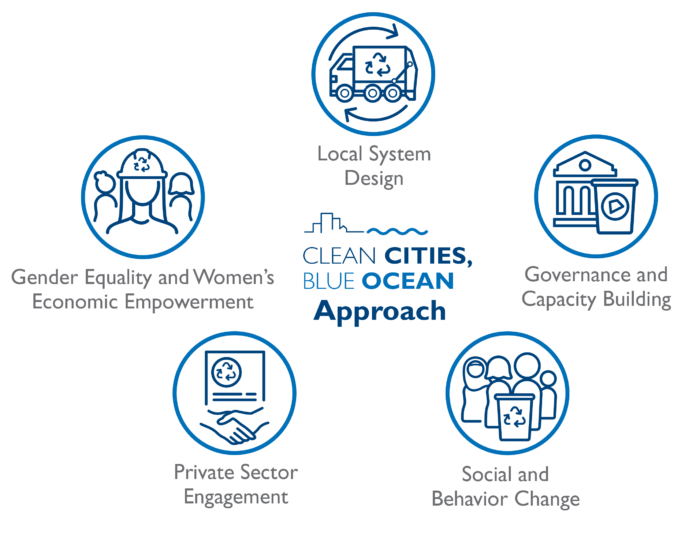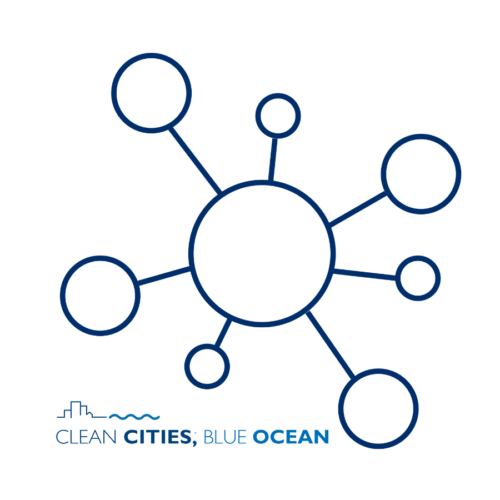Clean Cities, Blue Ocean’s approach is grounded in implementation of the principles and priorities of the Save Our Seas Act 2.0 legislation – specifically Section 202 – as well as USAID’s deep experience in advancing comprehensive local solutions to complex development challenges.
Technical Approach

Promote reduce, reuse, recycle (3R) practices and provide support to enhance local solid waste management systems
Reducing the volume of waste flowing into our oceans and waterways requires improved local solid waste management systems as well as increased uptake of 3R practices. Both require incentivized markets for recycling and reuse, supportive infrastructure, and strong enabling environments. Across its focal countries and engagement sites, Clean Cities, Blue Ocean is identifying and establishing incentives for strengthened reuse and recycling markets, working to improve solid waste management systems through new technologies and infrastructure, and enhancing self-sustaining service delivery models for increased efficiency and revenue generation. The program prioritizes locally-centered strategies that empower individuals, provide increased economic opportunity for women and men, and address sectoral health and safety challenges.
Build social behavior change for 3Rs and sustainable solid waste management
The program works to shift ingrained recycling and solid waste behaviors in households, businesses, and in government to actively support the 3Rs and improved waste management. The program uses a participatory approach, working hand in hand with community members, local organizations, women, youth, independent waste collectors, and the public and private sectors to understand the socioeconomic and cultural roots of behaviors and design innovative approaches to introduce feasible alternative behaviors.
Improve local implementation and enforcement of laws, policies, and regulations
Although many countries have local- and national-level laws to safeguard public health and the environment, regulate waste management and reduction, and even incentivize and strengthen recycling and reuse markets, implementation and enforcement is often challenged by limited support, resources, and system complexity. The program supports focal country partners to develop, implement, and enforce regulatory measures that address local challenges, improve financing options, and enhance the livelihoods of the millions that work in or are otherwise impacted by the sector.
Forge new private sector partnerships for increased impact, sustainability, and forward-looking commitments
Around the world, momentum and interest in combating ocean plastics pollution is rapidly increasing; however, global success requires coordination, partnerships, and continued, rapid learning about the associated issues and potential, locally-relevant solutions. Clean Cities, Blue Ocean works to build sustainable partnerships, increase the capacity and knowledge of those that can offer support, and garner commitments from the public sector, multi-stakeholder alliances, and intergovernmental organizations for continued progress—within and beyond the program’s lifetime.
Further Gender Equality and Women’s Economic Empowerment
Globally, women play a critical role in the solid waste management (SWM) and recycling sectors. They serve in both formal and informal positions as waste collectors, owners or employees of small recycling centers and junkshops, workers in plastic and pre-processing companies, and sometimes as owners or workers in upcycling enterprises. Women are virtually absent from the middle reaches of the SWM value chain, and though they may serve as executives in large plastic manufacturing companies, they represent a fraction of SWM sector leaders. At every level of the SWM value chain, women face gendered structural barriers that limit their earning power and constrain their access to opportunities for upward mobility. The program seeks to further gender equality, women’s meaningful participation, and economic empowerment in all levels of the SWM sector to achieve multiple development outcomes.
In the Philippines and Indonesia, the program’s Women in Waste’s Economic Empowerment (WWEE) Activity empowers women at the lowest rungs of the solid waste and recycling sectors to establish or expand their waste livelihoods and businesses. Learn more about the program’s gender equality and women’s economic empowerment focus here.


